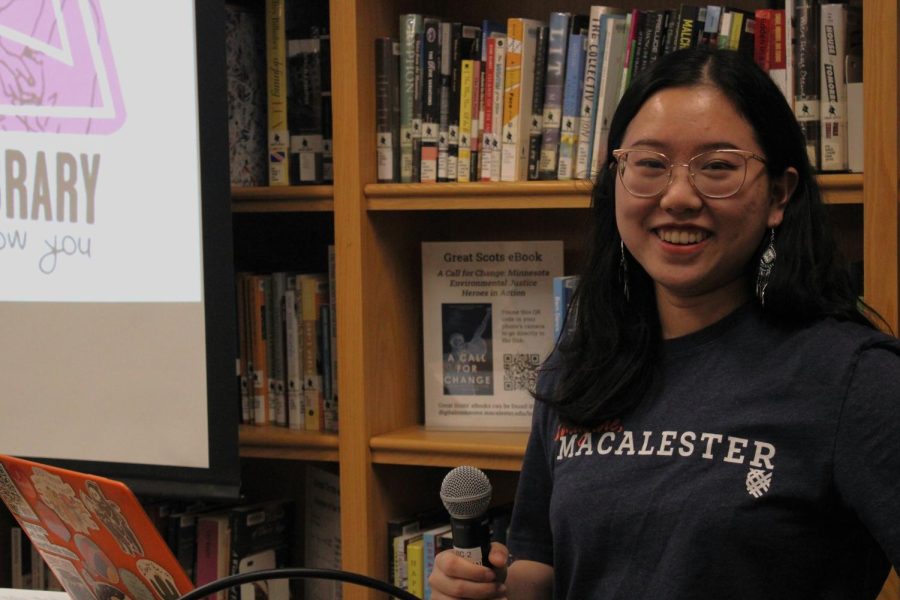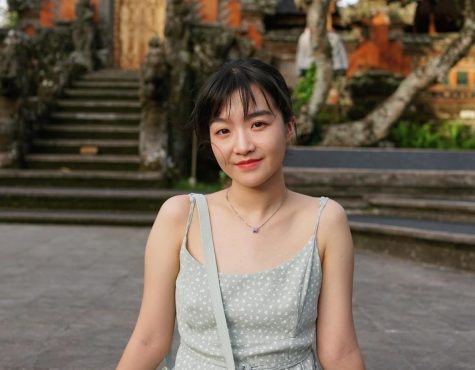Community bonding and learning through Human Library
March 9, 2023
On the afternoon of Feb. 27, about 50 students, faculty and staff gathered in the Harmon Room in the DeWitt Wallace Library, reading intently. What they read were not typical books, but “human books.”
The Human Library concept was first initiated in Copenhagen, Denmark, in 2000. It aims to eliminate prejudice and find a new way of building mutual understanding of different identities by inviting people to talk to those they would not normally meet. “Books” tell their personal stories, while “readers” gather around to listen and ask questions.
Having participated in and organized a Human Library in the past during high school and in internships, Rola Cao ’25, a student worker at the Office of Student Leadership and Engagement (OSLE), decided to bring this activity to the Macalester campus. To connect it more strongly with the idea of leadership and engagements, Cao revamped the traditional Human Library format by inviting people involved in leadership on and off campus as “books.”
“At Macalester, we have a lot of diversity and leadership on campus…[but] lots of students […] don’t see themselves as leaders for what they do,” Cao said.
She hopes that by telling stories and building a communication platform, this event can give people an opportunity to get more credibility and recognition from others.
“I am not creating leaders,” Cao said. “I’m just putting spotlights for them, so they can amplify their voices.”
MaKaila Knight-Allder, the Assistant Director of Residential Life and Staff Development, was invited as a “book” to share her story of “Un-Control”, her book on stepping back so others can step forward. She found the event helpful for people to find connections and appreciate differences from each other. She is also considering bringing this event format for future residential assistant and staff training.
Since she was assigned to present in the last round, Knight-Allder was able to be a “reader” for the previous three rounds.
“Being a reader was very easy because you just show up and keep an open mind … but being a book itself was a lot harder,” she said. “I’m the type of person who doesn’t like to be very vulnerable, so I was kind of challenging myself. But once I started and saw the reaction of people listening, it became really reaffirming.”
Another “book,” Kelly R. MacGregor, professor of geology, shared the same sense of vulnerability when telling her story of adversity during her field research last summer. She thought it was a powerful way to learn from other people as well.
“I wish I could do [Human Library] in every class that I teach,” she said. “I think we should just take advantage of it more … building empathy and building trust with each other on campus and getting to know members of our community that we might not otherwise engage with.”
Community bonding was another motivator for Cao to create this initiative. She wanted to provide a channel for people to expand their network beyond the close-friend circle in an in-depth and engaging way.
“A lot of people you know, but you don’t know their stories, and they really don’t get to share,” Cao said. “I hope students can break all those cliquey boundaries so they can know more people in other ways.”
Tenzin Gyaltsen ’24 felt grateful for this opportunity to know more people.
“Over the last three years at Macalester, I only know very few people even though the college is small,” he said. “So, I think that [a] Human Library is a very good way to know others in a deeper level.”
For him, it was also a way to let more people understand his statelessness identity as a Tibetan-born and Indian-raised. He showed his travel documents at the beginning of the story for readers to know how “statelessness” has affected his life and formed his identity.
“It is important to realize that there are people who have been in [a] social circumstance that’s not very ideal … and it’s also important to think how we could better improve that situation, being empathetic,” Jessica Yang ’26, a “reader” at the event said. “It’s a very reflective experience hearing from people who have [grown up in different backgrounds].”
Yang said that she looks forward to the following Human Library event and hopes to have a more intimate environment, such as individual rooms for each book, to get a more immersive experience.
“Reader” Samara Kurien ’23 also suggested a bigger, more private location.
“Because I feel like people are already saying very vulnerable stories for a fairly large group of people … and having a lot of people walking by [the Harmon Room] feels less like a comfortable space sometimes,” she said.
Kurien also hopes to see a more diverse group of “books” for the future Human Library.
“I would love to see some less visible people on campus next time, like a custodian or someone whose work doesn’t get recognized [often],” she said.
It is not the first time OSLE has hosted a Human Library, with the first one debuting in October last semester. This time, most of the “books” were nominated by participants from the previous session. As the initiator and organizer, Cao has seen the Human Library become more popular and more recognized within the Macalester community and was blown away by the attendance this time. It was a challenge for her to balance various aspects of the logistics during the event planning.
“So that was also a very vulnerable process for me,” Cao said. “Because I’m putting my name out there.”
She has been actively reflecting on how to improve future Human Library events.
“I notice people have to leave in the middle of a session,” Cao said. “I understand that. I respect that. But as an event planner, I definitely want to plan our future events in a more effective way so people can stay for the full round.”
She is hoping for domestic student speakers to join the future event.
“I want to represent our school better with a more proportional representation of our school population,” she said. “If you see my reach-out list, [the number of international and domestic students] is proportional. But when I get responses back, I hear more responses from international students.”
Currently, Cao is working on a new Human Library event supported by Macalester Racial Justice Project Fund. The event will be hosted in Asian American and Pacific Islanders (AAPI) month, aiming to present the cultural complexity of different Asian cultural groups and raise awareness of social discrimination and stereotypes that are harmful to Asians and other minorities.
She hopes this themed Human Library event can create more Asian solidarity and promote cross-group understanding of racial justice.
“Racial justice sometimes is like an issue in a parallel universe,” Cao said. “You need to talk to the people to really see even if you’re in the same society but are experiencing something totally different.”
She also plans to invite external speakers from the Macalester alum community and provide special merchandise to make it a more memorable and thought-provoking event.
“I’m really thankful for the support of OSLE that allowed me to take off to do things I want to do without [many limitations],” Cao said. “ I am grateful for the opportunity from Racial Justice Project and support from Hana Dinku and Alina Wong. I think [this Human Library will be] another way of celebrating the Macalester community on a bigger scale.”













